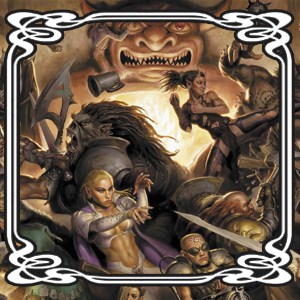The Green Hermit
Hero
As a beginning DM with beginning players, I love boxed text. However, I don't always read it word for word. It depends upon the situation.
Only a small percentage of players run their adventures in English? Do you have any data for this, because it doesn’t make a lot of sense. While sure, the game is played all over, there are several primarily English speaking countries, all where the game is popular. Presumably players are running the adventures in English in the US, UK, Canada, Australia, etc.I despise boxed text.
-First of all, boxed text is primarily in English, and only a small percentage of D&D players runs their adventures in English. While most D&D players can be expected to be fluent in English, reading the boxed text aloud interupts the current language being used by the group.
-The phrasing of the boxed text will almost always be entirely different from how the DM himself describes things, creating a jarring contradiction. The DM may also be asked by his players what the boxed text means, when difficult words are used. What an adventure in my opinion should do, is give the DM all the information they need to describe a room in their own words.
-The boxed text often leaves out important information about a room, or includes details that are missing in the room description. This sort of sloppyness is all over dozens of D&D adventures, and is the main reason I don't like running published adventures.
-Boxed text often tries to relay a lot of information in a way that is difficult for the players to parse, especially if the boxed text is overly wordy and English is not the groups primary language. This prompts the DM to either have to reread the boxed text, or translate in his own words what the boxed text means. Which raises the question, why not just always let the DM do this himself?
-Boxed text breaks immersion. It calls attention to itself when read aloud in a manner that takes players out of the game.

Only a small percentage of players run their adventures in English? Do you have any data for this, because it doesn’t make a lot of sense.
Well, if you read that article I linked to, you’d see the google trends are almost all primarily English speaking countries. So it’s safe to assume a lot more than “a small percentage”of players are playing in English. Your claim gets even less probable when you’re also arguing the players are playing in a different language than what the books are written in.Sure it does. There are more countries in the world where English is not the primary language. There for, there are more none-english players in the world. Its not that hard to reach this conclusion.
And sure, D&D books are translated to a few other languages... but all languages? I suppose French and German players may have D&D books in their own language, but a lot of other languages are not supported.
Well, if you read that article I linked to, you’d see the google trends are almost all primarily English speaking countries. So it’s safe to assume a lot more than “a small percentage”of players are playing in English. Your claim gets even less probable when you’re also arguing the players are playing in a different language than what the books are written in.
Again, I’d have to see some data that only a small percentage of D&D players speak one of the following: English, French, German, Italian, Japanese, Spanish, Polish, and Portuguese (translations by Gale Force Nine as of 2017). The sales numbers don’t back that up at all. I think it’s pretty clear that the majority of players speak one of those languages (as their primary language) based on sales numbers. And if not a majority, certainly a lot more than “a small percentage”.To clarify, when I say a small percentage, I mean of the total number of all D&D players in the world.
There are more countries in the world where people don't speak English as a primary language. And even if they do speak English, it is unlikely they don't run their campaigns in their native language. That is just common sense.
So imagine being a Vietnamese player, and reading the English boxed text aloud in the middle of your Vietnamese campaign. Heck, I'm a Dutch player, and our country is considered the most fluent English speaking country of all none-english speaking countries. Do you think we run our campaigns in English? Hell no!
This is one of the reasons I'd rather see boxed text go the way of the dodo.
Again, I’d have to see some data that only a small percentage of D&D players speak one of the following: English, French, German, Italian, Japanese, Spanish, Polish, and Portugese.
Yes, but that doesn’t mean the vast majority of D&D players play outside of that list, right? The sales data (at least what we’ve been told over the past few years) tell us where the game is being played the most. If you’re gonna make a claim that only a small percentage of D&D players come from that list of countries, you have show at least some data. The more outrageous claim, the more substantive data you need to show it.You do realize that there are A LOT more countries than that where people play D&D?
